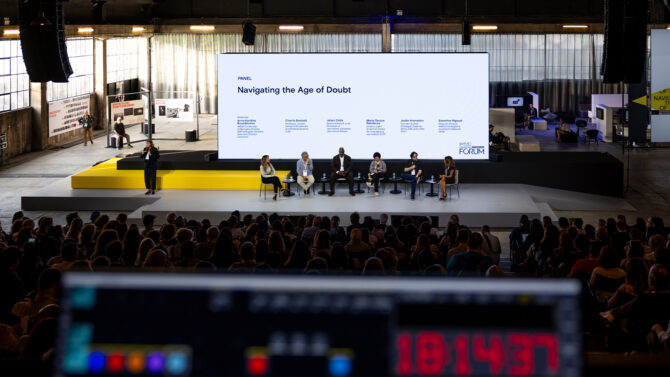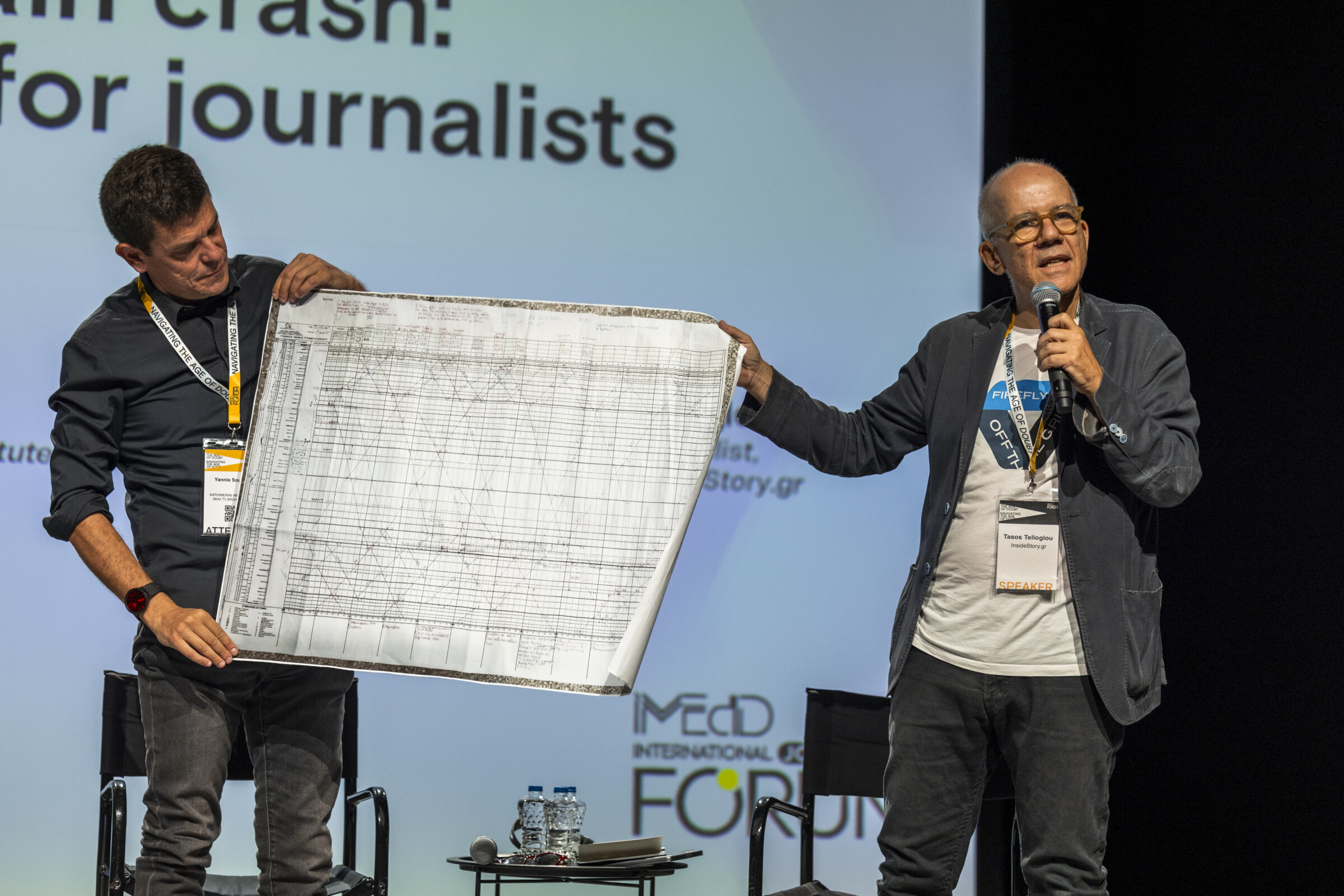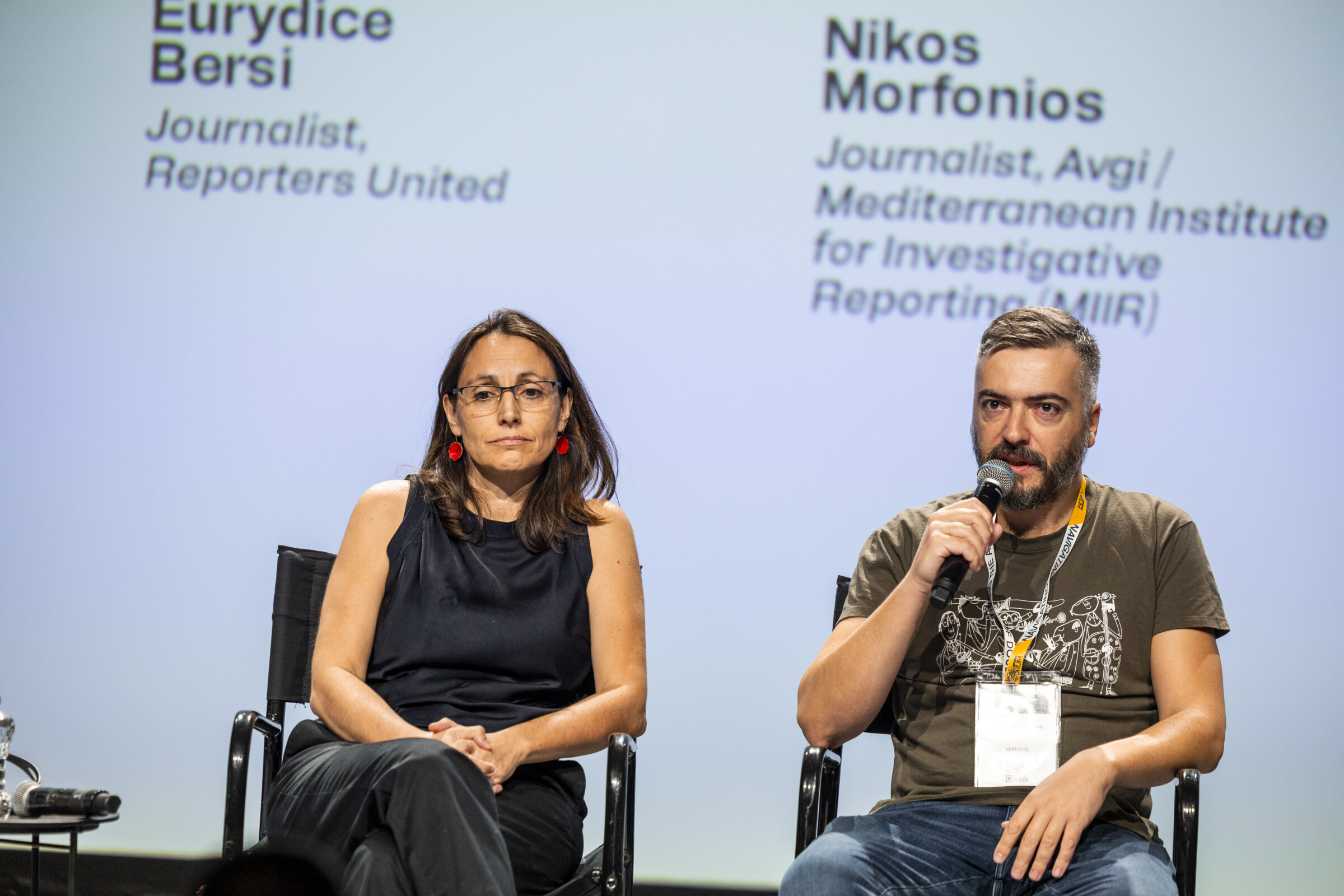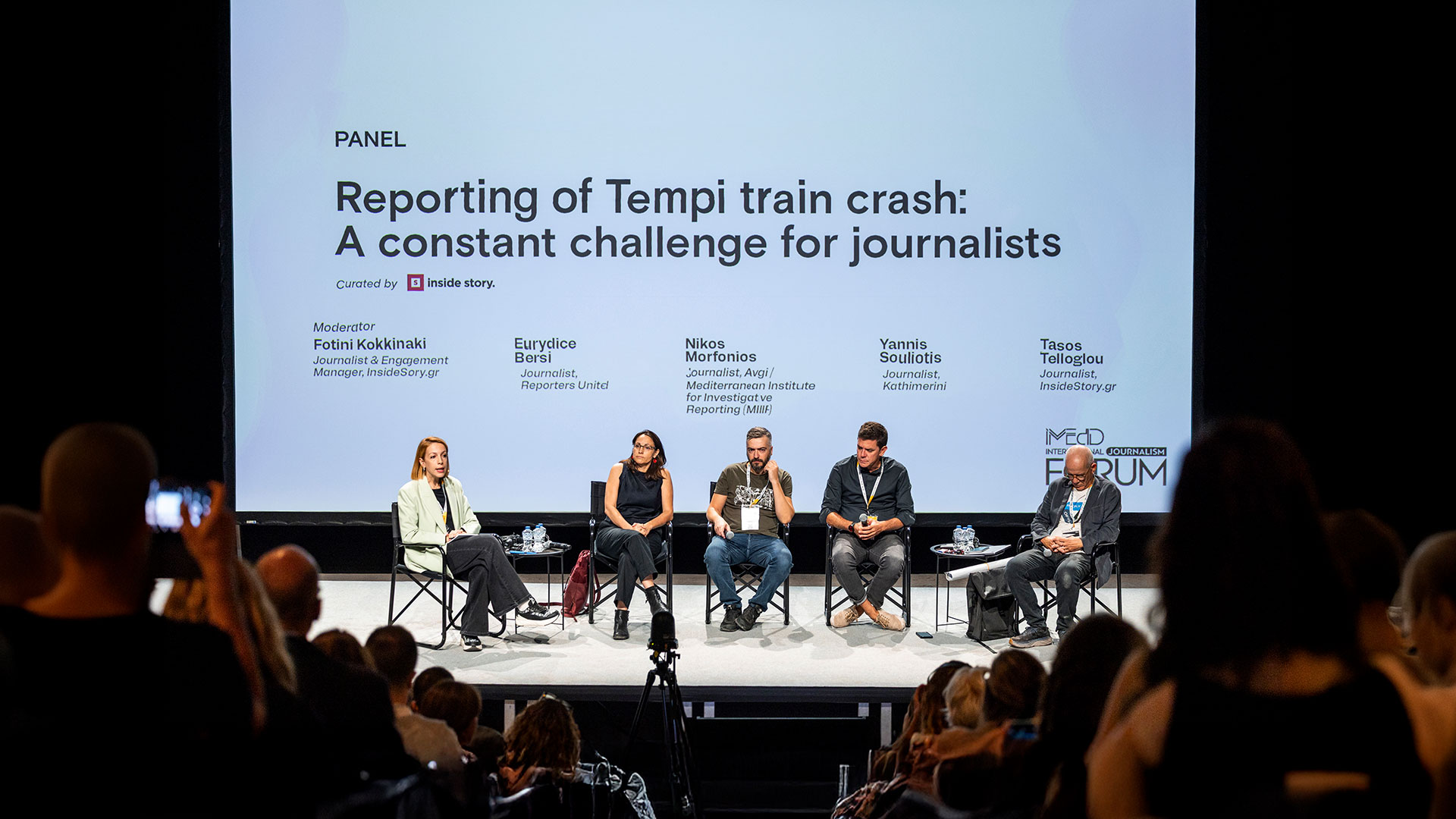The panel discussion “Reporting of Tempi train crash: A constant challenge for journalists” at this year’s iMEdD International Journalism Forum highlighted how four frontline reporters covered the railway tragedy.
Photos: Alex Grymanis, Christos Karagiorgakis/ iMEdD
“Navigating the age of doubt”: Journalists debate survival, trust and the future of their mission

The opening panel of the iMEdD International Journalism Forum 2025 highlighted a profession in flux, balancing threats and opportunities, technology and human values, skepticism and public service.
“This is the diagram for February 28, 2023. It’s drawn up by hand—how many trains passed, why others didn’t, why there were delays, why the trains ran into each other, where the passengers went. All of this is in the small notes down here. The diagram was made an hour and forty-five minutes after the accident.”
With that, journalist Tasos Telloglou rose from his chair on stage and held up a large sheet of paper covered with illegible handwritten notes. “Human error is one thing – the systemic way people are managed is another. The fact that this stationmaster was placed in that position may reflect a deeper systemic problem than the mere delay in carrying out a contract,” he said.
At the panel titled “Reporting of Tempi train crash: A constant challenge for journalists” held during the iMEdD International Journalism Forum and moderated by journalist and Engagement Manager at Inside Story, Fotini Kokkinaki, four reporters who covered the railway tragedy were invited to confront the audience and themselves.
Eurydice Bersi (Reporters United), Nikos Morfonios (Avgi/Mediterranean Institute for Investigative Reporting —MIIR), Yannis Souliotis (Kathimerini/SKAI), and Tasos Telloglou (Inside Story) explained that reporting goes beyond simply presenting the facts. It requires a deep understanding of scientific data, on-the-ground investigation, and meetings with experts, defendants, and the victims’ families —all within an extremely polarized climate, under intense political and social pressure, and amid high public expectations.
After his opening remarks, Tasos Telloglou asked for an audio clip to be played of the conversations between railway staff on duty on that fateful night. The recording suggests that, about half an hour after the accident, the traffic controller tried to find out in vain from the Larissa stationmaster exactly what had happened.
Eventually, a more experienced stationmaster had to call the lone security guard on duty at the previous level crossing. “The whole system was blind. The system only learned about the train collision from an outside source,” Telloglou said.

Nikos Morfonios has been covering transportation for several years, long before the Tempi tragedy. At some point, he conducted a major investigation for MIIR on the lack of safety systems and the dismantling of the railway. “A colleague who was editing the investigation would call me every 20 minutes: ‘Is this true? Is this really happening?’ She would ask, ‘Are we going to get sued by Hellenic Train? I replied that everything I wrote had been cross-checked and was accurate,” he recalled. “She couldn’t believe that this was really happening — and she’s a very experienced journalist. Unfortunately, in 2023, it was confirmed in the worst possible way.”
In her opening remarks, journalist Eurydice Bersi said she feels that journalists have failed. “If we had done our job properly, if we had highlighted all the problems in their full context, there’s no way the judicial inquiry would now be closing with so many gaps,” she said.
If [journalists] had done our job properly, if we had highlighted all the problems in their full context, there’s no way the judicial inquiry would now be closing with so many gaps.
Eurydice Bersi, journalist, Reporters United
“This wasn’t just due to our own shortcomings, but also because we are facing a highly organized campaign to influence public opinion. Instead of trying to shed light on a tragic accident, we are faced with a wall of misleading statements and constant attempts to steer the conversation in one direction or another,” Eurydice Bersi said.
She added later: “Of course, we are not wasting out efforts (by reporting on Tempi), but we must not forget how strongly some things are shaped by the political climate and by political power. We see such obvious cases of responsibility being shifted onto people who were simply following orders.”

Yannis Souliotis highlighted, among other things, the lack of specialized reporters covering transportation in the newsrooms of Greek media. “This was a gap that we were called to fill, after the railway accident had already occurred,” he noted.
At another point, he spoke about managing emotions. On the eve of the two-year anniversary of the accident, Prime Minister Kyriakos Mitsotakis, for the first time, suggested during a televised interview that the freight train might have been carrying illegal cargo —a claim that was later not supported by the legal investigation, Yannis Souliotis said.
“Then, even those who had been extremely skeptical about such a possibility suddenly started talking about illegal cargo. The editor-in-chief at the TV station or newspaper would come in and say, ‘What about this video (of the train)? Is that shadow the tank?'”
He described that, in the course of his reporting, he spoke with one of the victims’ parents. “During the interview, he kept ‘passing the ball’ back to me because he wanted to steer the conversation towards the technical aspects. His own investigation had led him to conclude that there was no illegal cargo,” he said. “At the time, we had recorded it simply as an interview with a relative, and we systematically ignored all of that […] Looking back from a distance, it was a mistake in how we managed our sources, the relatives, the emotions, and the balance we should have maintained.”
[Lack of specialized reporters] was a gap that we were called to fill, after the railway accident had already occurred.
Yannis Souliotis, Kathimerini/SKAI
The panelists agreed that one of the most challenging aspects of covering the Tempi case was engaging with the victims’ families. Nikos Morfonios noted that we must always approach people who have experienced such tragedies with respect, calm, and humility, in order to uphold journalistic ethics, verification, and thorough documentation.
“We are influenced by the parents we speak with. It’s a very difficult part of the job, but at the same time, the parents open paths for reporting. We gain much easier access to the case files, and let’s not forget that, thanks to the families, certain issues were also brought to light — for example, the so-called ‘landfilling’ that altered the accident site,” he said.
Watch the full panel discussion here

